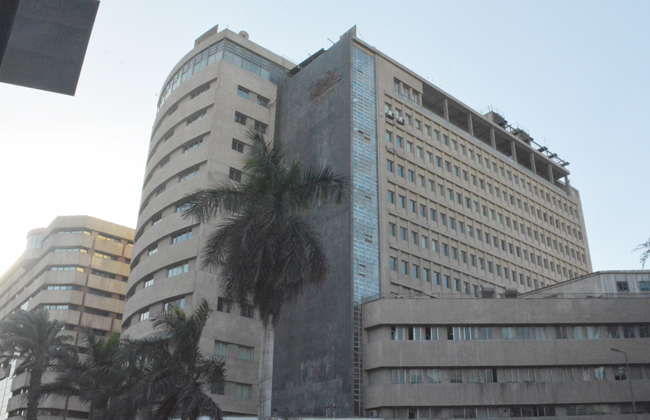He Turned Some of Them to E-Papers: That's How Sisi Writes the Obituary of Paper Press in Egypt

For the past three decades, Cairo has been the source of soft power affecting its Arab, African and Islamic surroundings through its press, media and arts, but with the advent of the current regime it has abandoned its potential and lost its luster due to the repression that has affected all corners of its soft power.
On July 15, 2021, the star of Egypt's oldest three government evening paper newspapers since the 1950s, in accordance with the National Press Authority's decision to convert the Al Messa (The Evening), Massai Ahram (The Evening Pyramids) and Al-Akhbar Al-Massai (The Evening News) newspapers, from daily publications to electronic versions only.
The apparent decision comes to counter the losses of newspapers, by saving the costs of printing them and selling some of their assets, but its interior according to observers, came because of the deprivation of press freedom, and the transformation of newspapers (government and private) into a trumpet and voice of the regime, all of which issue one headline, which led to a sharp decline in their distribution.

The crisis in government newspaper losses worsened sharply following the regime's crackdown on freedoms, the imprisonment of dozens of journalists, the purchase of sovereign equipment for most newspapers and websites, as well as satellite channels and radio stations.
Turning all newspapers into a single horn moves under the instructions of the security services, or as activists say: “The Instructions of "Mobile Samsung", referring to the intelligence officer who directs them by phone.
Causes of Deterioration
"The interruption of paper newspapers is not only due to financial losses, but also to the repression that has turned them into similar government bulletins," this was the conclusion of the vision of two members of the Journalists' Syndicate Council and three Egyptian journalists speaking of "Al-Estiklal".
"There have been instructions issued since 2017 for government and private newspapers purchased by the intelligence services not to deal with any topics related to the corruption of government agencies on the grounds of highlighting achievements," which led Egyptians to refrain from buying them.
On March 11, 2015, security agencies arrested and confiscated a number of the private newspaper Al-Watan before printing it, due to a press investigation in which it noted that 13 ministries and sovereign destinations, including the presidency and intelligence, had failed to pay their taxes.
The crisis increased as the military intelligence official Colonel Ahmed Shaaban instructed newspaper editors to publish what was published, and newspapers appeared as government bulletins without press arts, according to the sources for "Independence".
Mohamed Saad Abdel Hafeez, a member of the Council of the Journalists Syndicate, said that the Egyptian press crisis is the "absence of freedom", as well as "the previous and subsequent blockade and censorship imposed on press content".
"The transformation of most of Egypt's newspapers into propaganda bulletins that convey the government's point of view in news, reports and articles whose titles are sometimes identical is the reason why newspapers are retreating," he said.s
"One of the causes of the crisis in print journalism is the lack of depth, accuracy, analysis and commentary, and in order for those elements that restore the press's luster and credibility to be realized, the building base must be freedom, without freedom there will be no such way," he said.
In an article published on Egypt 360 on July 10, 2021, Abdel Hafiz adds other reasons for the losses and debts of government press organizations that led to the suspension of the printing of the three evenings, including lack of depth and lack of disclosure of facts.
"Has the press clashed with the reader's concerns and issues? Or are we all going through the cycle of data transfer and canned statements to the extent that Egyptian newspapers come out with the same headline?"
"The Editing halls are going through a real crisis when dealing with the news of the institutions of government and the issues of the citizen and his crises, which prompted the citizen to abandon them, and to look for other alternatives that meet his desires for knowledge and clash with his concerns and issues even if they are unreliable," he said.
Qutb Al-Arabi, assistant secretary general of the Supreme Press Council under President Mohamed Morsi, believes that closing paper newspapers and converting them to electronic copies will not be limited to the three evening newspapers that invited their readers, but will be followed by other newspapers.
"The regime is now relying on a unified media system that speaks its name, including newspapers, satellite channels and companies owned and operated by intelligence, so it is normal to close newspapers that do not interest him because they have dozens instead," he told Al-Estiklal.
One Opinion
"Sisi's regime is based on the idea of a single media voice, so it has been suppressing and nationalizing the press since 2013, closing newspapers and arresting journalists to prevent any opposition to it," Al-Arabi adds.
Egypt has 8 government press organizations, issuing 55 paper issues, most of which suffer from declining distribution, while the three evening paper editions employ about 653 journalists, who move to work on the website.
But Mahmoud Kamel, a member of the union's council, told Al-Estiklal: “The decision to turn these newspapers from paper to electronic will expose journalists to problems because the journalists' union only recognizes a journalist working for a paper newspaper”.
Media expert Yasser Abdel Aziz expects more paper newspapers in Egypt to die because of the dramatic shift in technology and the world's orientation to electronic journalism.
But Egyptian authorities are likely to keep some paper versions of the press "symbolically and limitedly," he told the BBC on July 13, 2021.
Monsters of Oppression
On the day of the decision to stop printing the three newspapers, July 5, 2021, Reporters Without Borders issued a 2021 list of what it described as "Beasts depriving press freedom."
The list included 37 heads of state and government who were cracking down on the media, including, of course, Egyptian regime president Abdel Fattah Al-Sisi as one of those "monsters" who violated press freedom, imprisoned and tortured journalists.
The organization said: The press is dying under the weight of Corona and tyranny, and Egypt ranked low in 166th place out of a total of 180 countries.
This year's "blacklist" has governors in power for more than two decades, and 17 new ones who joined for the first time, including two women and a European president, she said.
It noted that seven of the current 37 tyrants (including Sisi) are on the list of "beasts of press freedom" in the 2020 edition of Reporters Without Borders.
She described the 37 as "rulers who practice mass repression in the most severe manner, either by establishing censorship bodies perched on their chests, placing journalists in arbitrary detention, or inciting violence against them."
"Sixteen of these freedom-negative tyrants are concentrated in the countries of the black region on the world map of press freedom, compared to 19 in the red zone countries," it said, calling it a "very dangerous situation."
RSF's 2021 World Press Freedom Index
— Human Rights Defenders (@HRDefsEN) April 20, 2021
1 Norway ����
2 Finland ����
13 Germany ����
44 USA ����
111 Brazil ����
153 Turkey ����
180 Eritrea ����#Turkey��
��The government controls 90% of the national media.
��Internet censorship has reached unprecedented levels. https://t.co/dUwrnSebKw pic.twitter.com/yh2RWKDQqC
Declining Distribution
According to information obtained by Al-Estiklal, the deterioration of the distribution of the three evening newspapers before they were closed and converted into electronic newspapers did not even take place until the last number of Al-Akhbar Al-Massai distributed only 600 copies, of which 2,400 copies were returned.
The Al-Akhbar Al-Massai losses from “Akhbar Al-Yom” were estimated at EGP 37 million at the end of 2020.
Government newspapers with an estimated 55 issues have losses of 25 billion pounds, according to the national press authority.
The most recent census of the Central Agency for Mobilization and Statistics (official) released May 3, 2020, showed that the 70 newspapers published in 2018 (daily and weekly) distributed a combined 547,000 copies.
The distribution of the same newspapers in the year of the January 25, 2011 revolution was nearly 1 million copies (920,000), and in 2012 it fell to 646,000, the lowest distribution rate in 2017 at 510,000.
As the situation of press freedoms deteriorated and political agencies began to acquire private newspapers from 2017 to 2021, Egyptians were clearly reluctant to buy any newspapers, further deteriorating their distribution.
"Distribution rates fell for the worst in 2019, 2020 and 2021" and orders were issued to reduce the number of publications daily and weekly, according to distribution workers for Al-Estiklal.
In the absence of new official statistics, Saad Abdel Hafiz said the distribution figures for all print newspapers are currently between 70 and 300,000 copies, according to sources familiar with the distribution figures.
"There is a weekly newspaper that does not distribute more than 500 copies, and another that employs hundreds of journalists and employees does not print up to 1,000 copies a day," he said in his previous article referred to on Egypt 360.
In April 2017, Al-Masri Al-Youm published "the real distribution figures of the most important Egyptian newspapers," asserting that the oldest Egyptian newspaper Al-Ahram, which distributed one million copies a day alone, distributed 110,000 (now declining further).
The distribution of "Akhbar Al-Yom" reached 90,000, and "Al-Jomhoreya" 35,000, and private newspapers such as "Al-Watan" fell to 12,000, and "Al-Shorok" to 7.8,000 figures that have fallen more than half now, according to Al-Estiklal sources.

Abdel Moneim Saeed, the current chairman of Al-Masri Al-Youm and former chairman of Al-Ahram, confirms that the distribution of all Egyptian newspapers has declined from 3.5 million in 2000 to 350,000 copies in 2017.
In an article published in Al-Ahram, June 28, 2017, he explained that this means that newspapers in 2017 distributed about 10 percent of their previous distribution in 2000.
Prior to the resignation of The Minister of State for Information, Osama Heikal, on April 25, 2021, he revealed that the distribution of newspapers in general had collapsed because of the lack of street pulse, compared to the opposition media abroad, which had plunged him into a conflict with the editors of the authority's newspapers.
"Newspaper distribution figures are a tragedy," Heikal said at the time, without mentioning a specific figure, despite declaring that "distribution figures are in my office drawer", and set the losses of government newspapers and their debts at 25 billion pounds.












